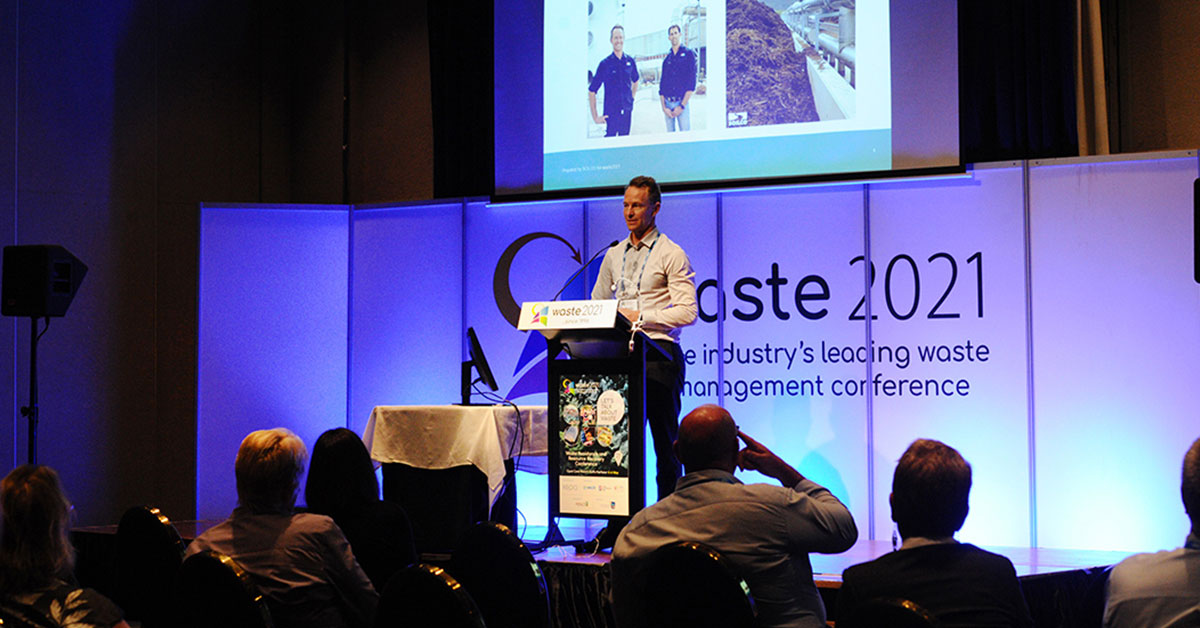SOILCO Supports FOGO for Healthy Soil at National Conferences
At this year’s Waste 2021 Conference in Coffs Harbour, SOILCO General Manager Charlie Emery presented on how SOILCO has worked with a number of local councils in New South Wales to increase the processing capacity of FOGO (food organics and garden organics) into quality-assured products designed to regenerate soil for dynamic growth.
This is also a key topic of conversation at this year’s Australian Organics Recycling Association (AORA) Conference in the Hunter Valley from 15 to 17 June.
SOILCO recycles FOGO into products that improve urban amenity soil health for end users including home gardeners and commercial landscapers. Compost can be incorporated directly into gardens as a soil improver. It can also be blended with other materials to create growing mixes or used for protecting the soil as a mulch.
Great end markets for recycled organics in urban amenity and infrastructure projects.
“There’s fantastic markets for compost and demand for quality soil health products,” Charlie said during his Coffs Conference presentation.
“At Sydney airport, 6 million square metres of soil needs to be revegetated. If you put 20mm of compost over that, that’s 120,000 cubic metres,” Charlie said.
Mike Twemlow from Edge Environment also presented at the Coffs Conference on how to meet the inevitable supply of compost from FOGO.
“The scale and rate of development across the state represents a huge opportunity in urban amenity to foster healthy and happy landscapes,” Mike said.
Edge did a market feasibility paper that investigated where the largest opportunities were for compost. “We found that the built environment represents one of those large opportunities to drive market pressure for compost products,” Mike said.
“And that’s largely down to the scale and rate or urban development. We split it into two – the property sector and the infrastructure sector including highways, tunnels and rail links.
“There’s a huge opportunity to use those adjoining green corridors across highways for compost.”

Sydney motorway trial shows soil blended with compost creates healthy green spaces.
Edge Environment won an NSW EPA Organics Market Development Grant through the ‘Waste Less, Recycle More’ initiative. The aim of the grant is to support market development activities that will improve the demand for compost processed from source-separated organics by increasing knowledge and awareness, improving product quality and demonstrating its benefits in new and innovative markets.
Driving demand for recycled organics (compost products) in the property and infrastructure sectors through integration in ratings tools and controlled case studies was the focus of Edge Environment’s project resulting from the grant.
The project aims to drive demand for compost products in property development (commercial, retail, residential) and infrastructure development.
Mike and the Edge team looked at how SOILCO’s ‘GO COMPOST Premium’ product could improve soil and plant health in a small plot of land at the M5 near Sydney Airport.
The team did ongoing measurements in a controlled case study comparing soil blended with compost to recycled soil low in organic matter between August 2020 and April 2021.
Mike presented his key findings at the conference and said: “No matter what type of soil you have, incorporating compost into that top 100 to 200mm will be beneficial. The use of some recycled soil may negatively impact plant and soil health.”
The recycled soil had a 22% plant death rate, whereas the composted soil had a 2% death rate during the 8-month trial.
“The moisture and carbon was three times as high in the composted soil. Increased organic matter has numerous benefits, including a greater ability for nitrogen to be mineralised by plants.
“The plants tested in the trial showed increased growth and green leaves and that’s down to the improved nutritional compounds within the composted soil and the improved micro and macro-organism presence.
“It’s really common to find worms and other organisms in the composted soil. Whereas the recycled soil was so compacted and dry that it was really hard to get soil samples and there was no sign of real moisture or any organisms present.
“Mushrooms are a clear indication of healthy soil. It was really common after rainfall to see where the control (the recycled soil without compost) ended and the compost started. There was a really obvious line of where the mushrooms were growing,” Mike said.
Project-based benefits of compost:
- Divert waste from landfill
- Increase water efficiency
- Retain ecological value
- Reduce the need for fertilisers
- Reduce the number of plant deaths and disease
- Greener, healthier, happier landscapes
- Improved economic side effects
Holistic benefits of compost:
- Locally available (increasingly so)
- Beneficial micro-organisms
- Improved biological, chemical and physical properties of soil
- Moisture retention
- Macro and micronutrients
- Affordable
- Increased carbon sequestration and reduced methane
- Improved mitigation against the effects of climate change
- Contributes to the long-term maintenance and health of soils
Please contact us to learn more.

